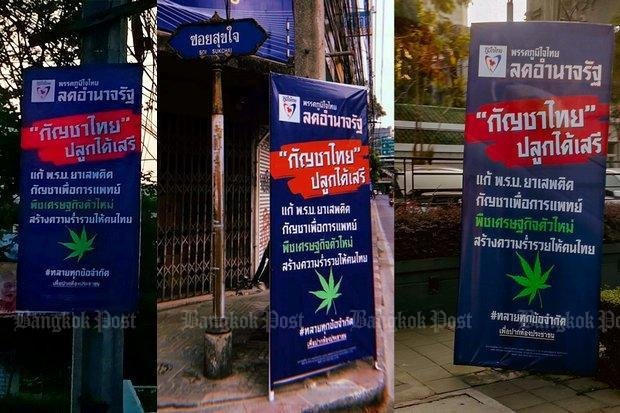Green economy? Thai party campaigns cannabis farming

Billionaire-turned-politician Anutin Charnvirakul thinks he has hit on a winning issue for Thailand’s election next month – promoting cannabis farming now that the Southeast Asia nation has legalized medical marijuana.
Campaign posters for his Bhumjaithai (Proud to Be Thai) party, the first major party to advocate its recreational use, feature an oversized green marijuana leaf.
“We know that marijuana doesn’t have any negative effects when somebody consumes it, apart from getting sleepy,” the billionaire-turned-politician told Reuters.
“When we weigh the pros and cons of freeing up this product, we decided to give full support,” Anutin said.
Thailand in December approved marijuana for medical use and research, the first country to do so in a region with some of the world’s toughest drug laws.
Bhumjaithai is one of several small parties vying for attention ahead of March 24, the first general election since a 2014 coup. The party, which draws its support from the rural northeast, won 34 of parliament’s 500 seats in the last poll.
The election’s main contest is expected to be between populist parties loyal to ousted ex-premier Thaksin Shinawatra and pro-establishment parties seeking to extend military rule through the ballot, but complex electoral rules mean
smaller parties will likely play a role in any coalition government.
Bhumjaithai, which also backs a four-day work week and legalizing ride-share taxi services, details its pro-pot policies on a campaign website that includes images of happy farmers and marijuana plants sprouting gold coins.
Anutin likes the California model where growers are registered and six marijuana plants are permitted per household.
The sale and distribution of pot products would be regulated similar to tobacco in Thailand, with farmers selling their harvest through a government agency, the party says.
“Marijuana will be able to generate additional income to farmers because overseas the price is as high as 70,000 baht ($2,230) per kg,” according to the party’s website.
TABOO STATUS

Anutin said it would be “a win-win situation for the Thai people because they will grow the plant and it will benefit the economy”.
Marijuana enthusiasts say cannabis farming will take time to develop in Thailand.
“It’s not that easy,” said Chokwan Kitty Chopaka, spokeswoman for Highland Network, a Thai group that promotes knowledge about cannabis.
She said Thai cannabis would be competing with products grown in some U.S. states and Canada where it is already legal for recreational use.Slideshow (2 Images)
“There’s already a market out there and they are a lot better at it than we are,” she said.
Thais used marijuana in traditional medicine and in cooking for centuries before it was banned in 1934. Further criminalization of cannabis in the past few decades has given the plant a taboo status in Thailand.
Somchai Sawangkarn, chairman of the parliamentary committee that drafted the December cannabis bill, said the goal was to help patients manage the pain of cancer and other illnesses, and lower a reliance on imported medicines.
Relaxing the law further would require more study, he said, and although he understood Anutin’s arguments, “it’s all a little bit too fast”.


















